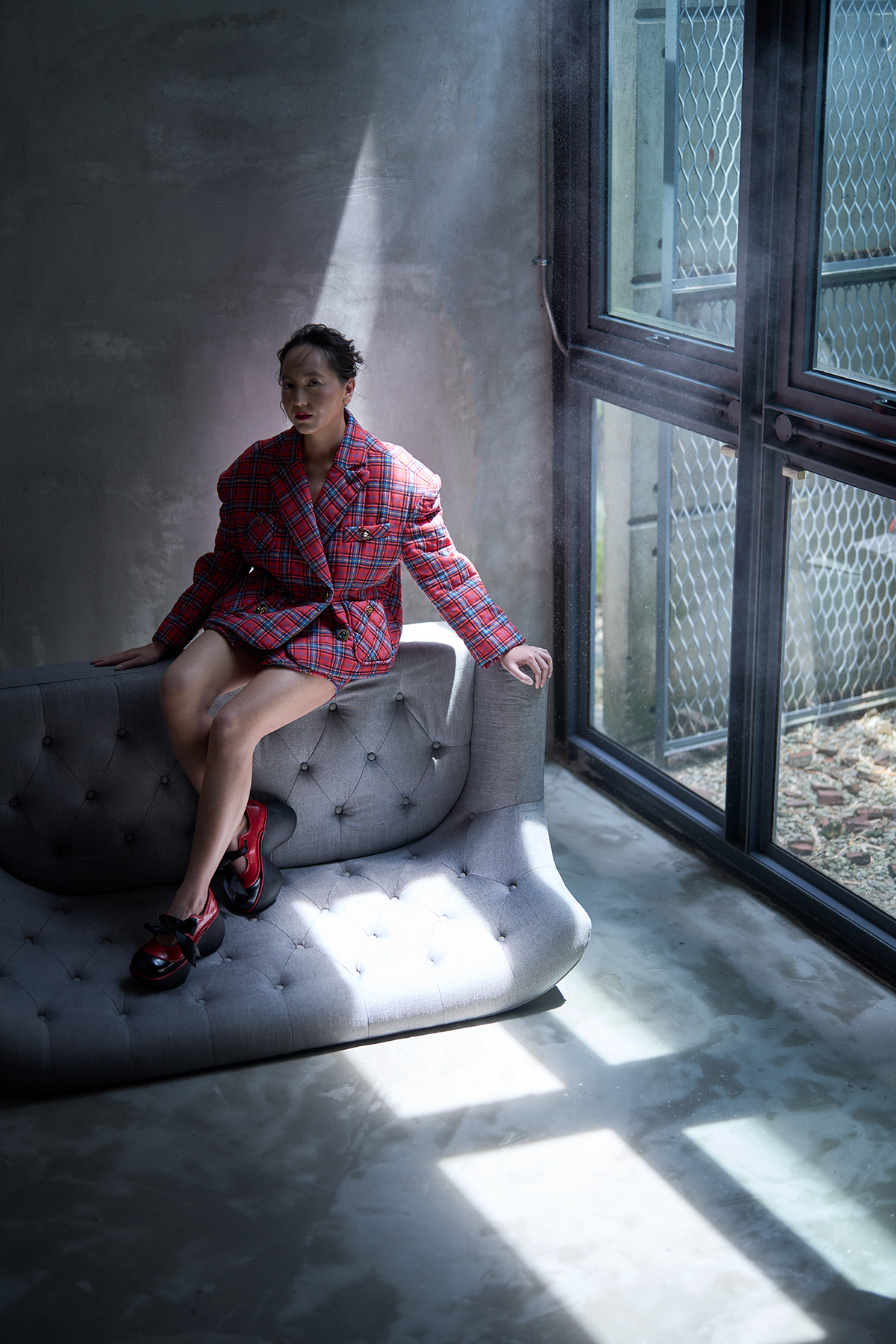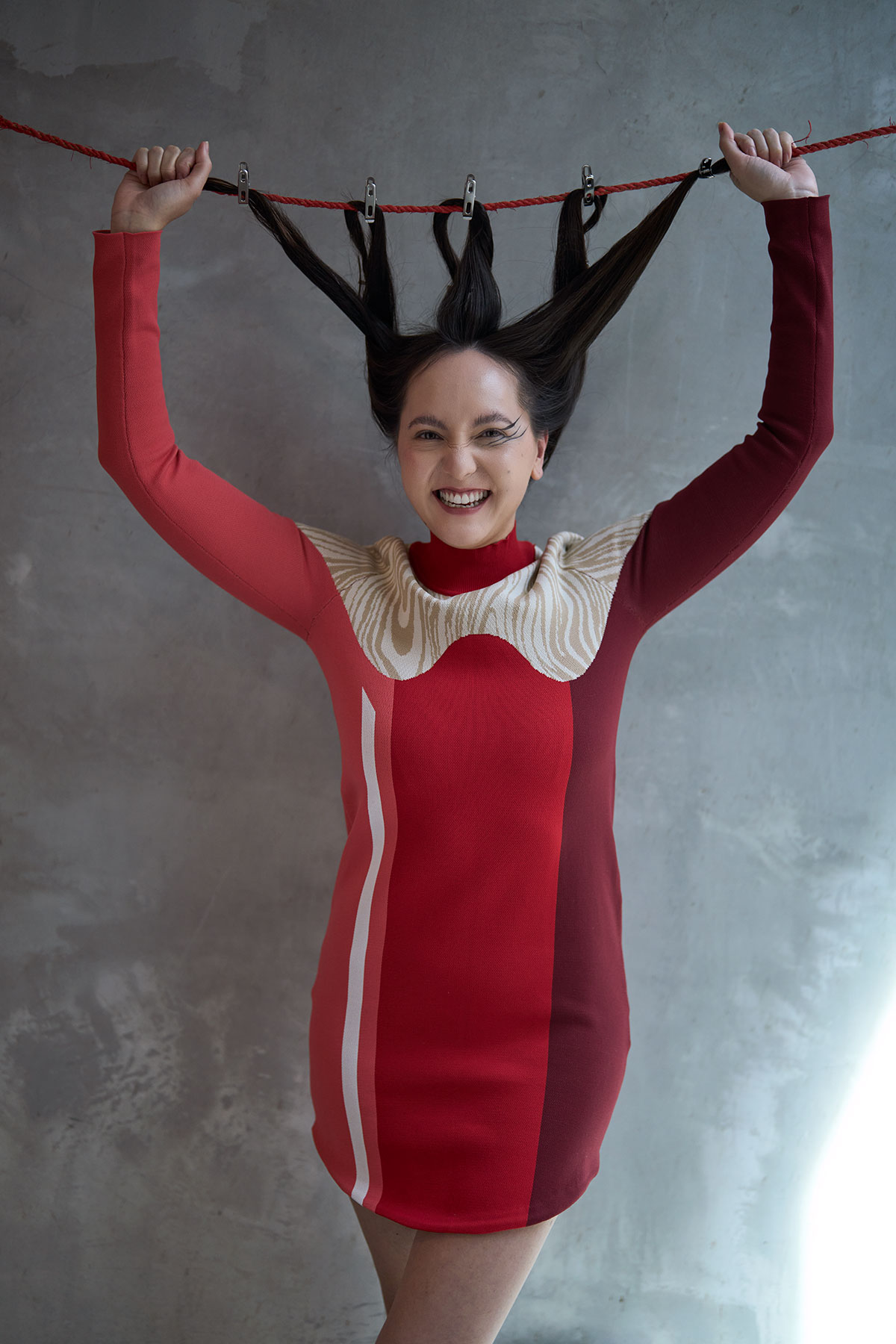It’s the 17th of May 2023. I am seated in a crowded, 200-capacity theater at the edge of the French Riviera. The lights dim, and the opening frame fills the screen – a young Malay girl clad in tudung, viscerally stares back at me. Three months of waiting to secure an accreditation, dozens of email exchanges and pitches to finance the trip and I’m finally seated for the world premiere of Amanda Nell Eu’s Tiger Stripes at the Cannes Film Festival. The following images and scenes of a Malaysian kampung milieu washes over me. Tears well up without intending. In a completely foreign land, among a European audience, the frame felt like a hug and postcard from home. The film itself, of course, is anything but a warm reminder of home, rather, it is a damning condemnation of the weight of socio-religious norms and expectations on young girls.
Ask any filmmaker, and they would likely say the feeling most equivalent to being selected in competition at Cannes, is getting blessed by the Pope. And it’s not hard to see why. After picking up the Semaine de la Critique Grand Prix award, a golden hue has followed the 38-year old filmmaker and her debut feature. The project, even in development, was charging through uncharted territories, being a recipient of multiple, highly-coveted grant schemes and is officially an eight-country co-production involving Malaysia, Taiwan, Singapore, France, Germany, Netherlands, Indonesia and Qatar. Since its premiere in Cannes, it has traveled to festivals around the world including BFI London Film Festival, AFI Fest, and is the opening title for Singapore International Film Festival (that is currently underway).
As a result of Eu’s acclaim, she was scouted and signed by Gersh, a leading talent agency in the United States. Needless to say, Tiger Stripes has cemented a place in the canon of Malaysian cinema, and will be a case study cited by industry experts for years to come.

At its finest, Tiger Stripes conjures the thrills of Mr Midnight novels, issues of Mastika or early Pontianak films (the latter two were direct sources of inspiration). The narrative propels forward through the eyes of 12-year-old Zaffan, a precocious and spirited girl, dealing with puberty – specifically, as she experiences getting her period for the first time – and the estrangement as a result of it. Zafreen Zairizal carries the role with real charisma and playfulness that makes you root for her from the start. Her performance is supported by equally strong turns from Piqa and Deena Ezral, who play Zaffan’s friends. The filial and societal strains Zaffan endures leads to an inevitable climax, but it is here Eu pulls an outstanding coup de cinema, through sheer practical effects that captures the magical realism of Nusantara folklore we have all grown up with. After years of slop from the Marvel-industrial machine, and as we enter a new advent of AI and visual effects, there is still grace and beauty in practical, tactile approaches.
To achieve the feat, she worked closely with her director of photography, Jimmy Gimferrer. “I wanted to have this vibe of old horror, and I wanted it to look wild and fun because those were our references. We looked at Hausu, the Japanese film from the 1970s, which had this weird, vibrant, bizarre fairytale aspect to it. We were also inspired by Michael Powell’s Black Narcissus, which had these intense shots of just the eyes, almost mimicking an animal. For the practical effects, we drew from 1950s Pontianak films or the tone of Mastika stories that was kind of comedic but at the same time it creeped the hell out of you.”
“Growing up as a Malaysian, these stories are funny to read, but then you’re like, oh, it’s actually kind of creepy. Like, that’s really weird. You know, maybe it happened in that village up there or whatever. Right?”

In Tiger Stripes, Eu exhumed fears she harboured as a growing teenager. “It was just a very visceral memory of mine when I used to punch my pubic bone away because I was terrified of it. I was just a kid about to start puberty and my bones were growing, my hair was growing. I hated it. It was a very violent reaction. I would hit myself. I would shave until everything bled because I didn’t know how to shave. I was just trying to figure things out on my own. That was really the beginning of Tiger Stripes.” The project, beyond being her directorial debut, was also the first time she’s ventured into writing in a feature-length format – a beast of its own. All throughout development however, she kept returning to this memory. “I wanted it to have that feeling and evoke that kind of fear. Eventually, it touches on many other social themes but that really came through during development.”
“What do I really want to say? What’s the heart of the film? It always starts with just a feeling or memory in my body. And then I kind of expand it later.”
The project received early support from Locarno Festival’s Open Doors programme, South Korea’s BiFan film festival, Talents Tokyo, Hubert Bals Fund, among others. Going through the wringer of multiple development programmes, while difficult and an all-too-new process for Eu and her producer Foo Fei Ling, was useful to sharpen the narrative edge. “I just kept writing treatments because it was going through writing labs. Some people don’t find it useful, but I liked it because I knew deep down what I wanted to say but I just needed help to push it towards that. It was really finding the core of the story because I wanted to do so many things. I spent one year trying to find this core, trying to find this one thing to push the story forward.” She remarked that when she eventually got started on the script, the process became easier. “I knew what was driving the story and what was the intention. Once I’ve got the characters and the plot, then I start researching. I start talking to other women and ask them about their experiences.”
“It was all a step-by-step process, building it up, and constantly changing little bits along the way.”

To bring these characters to life, Eu provided her actors with extensive notes, training and guidance. Save for small roles in commercials, all three were taking on their first major roles. “I love doing diaries and free-flow writing for them. I just write a bunch of rubbish nonstop, like pages and pages of that, and eventually things came out of it,” she says to me during a Zoom call from subzero Norway. Casting them was a longer process that took over a year (delayed by the pandemic). “I was not confident in directing actors. I was very nervous and insecure. I said to Fei that I needed time to cast these roles. We did quick 20-minute auditions. It was really just a chat, like I barely even got them to do any acting per se. But I wanted to meet girls who were curious, inquisitive; who wanted to explore and thought of things in different ways. I knew we needed acting workshops as well with a professional acting coach, which we got Bella Rahim to do. We ended up having 30 girls for the workshop. I hadn’t cast any of the characters yet because I wanted it to be open and free. I also hired a sex educator. I didn’t allow any photos or any videos to be recorded. Through the workshop, we created a space where the girls felt safe to play and learn. We ended up with Zafreen, Deena and Piqa, mainly because I just felt they were very suited to the parts, even though there were other brilliant girls in the group as well.”
More recently, Eu has found herself at the center of Malaysia’s antiquated censorship regulations. After the severe cuts LPF (Film Censorship Board) has made on Tiger Stripes for its local theatrical release, she’s sounding the clarion calls for better protection to local filmmakers and their freedom of expression. When we met during this shoot, Eu, wearing a John Waters ‘Pope of Trash’ t-shirt, and snugging a Hideo ‘Corgima’ tote bag – an indicator of her multiplicity of interests and varied influences – was still visibly incensed. “No censorship in Saudi Arabia!” she uttered under her breath. Her anger is entirely valid and an all-too common experience for filmmakers. She’s walking proof that despite the international acclaim and awards, it is still not enough to move the needle in this seemingly shattered nation. In a recent article from The Guardian, more details were revealed on the excised scenes including one “showing blood on a period pad, a girl trying on her friend’s bra over her uniform as they mess around in the school toilets, and Zaffan doing a joyous TikTok dance in a waterfall, her hair flowing.”
The irony in all of this remains that Tiger Stripes is Malaysia’s official entry to the Academy Awards.

“It was very painful, and that was why I had to say something about it. It’s not the film that I intended. I can’t stand by it. For me, it’s always been the case where if you don’t see the full film, I can’t talk to you about it. I can’t answer to it because that was not my intention.”
“The authoritative bodies deciding that Malaysians weren’t ready to watch this is also disrespectful to the audience. The audience is smart enough to decide for themselves. I empathise with local filmmakers [who would need to self-censor] otherwise it makes it so hard to get your film funded and financed even from the get go. That was why we decided to be more independent and go through grants. That freed us from the pressures of hitting box office. It’s a tough way to make a film, of course. It’s challenging and took us almost six years to actually build it together. And sometimes, you can give up, because it takes so long and it’s a struggle, but it was something we wanted to do,” she remarks as we hit the Zoom time limit.
Featured image: Amanda wears and outfit from Maje
Contributing Editor: Mabel Ho
Photographer: Delvin Xian
Art Direction: Anson Siau (assisted by Mon Kai-Siong)
Makeup and Hair: Asaki
Location: Imagerom, Petaling Jaya, Selangor.








